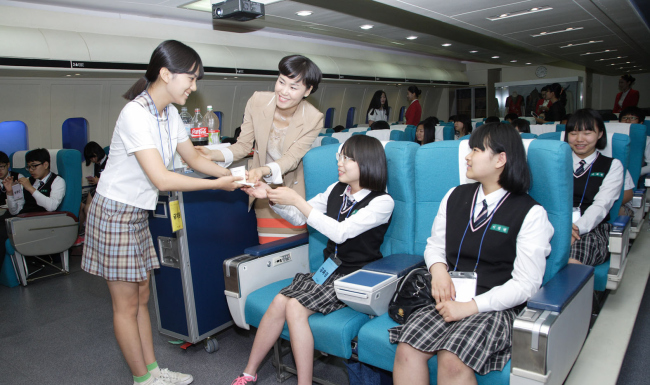Korean middle schools will likely have to scrap exams and offer a freer curriculum for one semester from 2016 under a government reform plan geared to boost creativity and career readiness among students.
Bold as it may be in a country where exam results determine success in life, the “free-learning” semester scheme is brewing controversy.
Parents are concerned about a possible decline in academic ability. Teachers are fretting about a lack of programs to replace the standard curriculum. Some charge that it will deepen educational gaps without support for schools in poor and rural areas.
The Education Ministry unveiled the first outline of the plan last month which has, for the first time, middle schools omitting official exams for one semester.
During that period, students will continue to learn major subjects including Korean, math and English. But they will be free from tests and instead spend time on career exploration activities, according to the ministry.
“The purpose of the free-learning semester is to encourage young students to explore career options while reducing pressure from their studies,” the ministry said.
As the first step, the ministry has selected 42 schools across the country to test-run the scheme in the September semester. It will be tried at another 40 schools next spring and be made mandatory for all middle schools in 2016.
The ministry is working with various think tanks including the state-run Korean Education Development Institute to develop programs and provide support for schools.
It will also seek cooperation from businesses, regional governments and public institutions to help students experience work and think of their future career.
The plan is welcomed by educators and experts in various fields as one of the most important overhauls in the Korean education system criticized for rote-learning at the expense of critical thinking and practical knowledge.
“I believe finding interests and thinking more seriously about their future careers are more important than studying math at their age,” said Kim Seong-seop, vice principal of Sunun Middle School in Gwangju. Sunun is one of the schools selected to test-run the system in September.
Critics are concerned about possible negative effects of the scheme. Students will return to cutthroat competition after the test-free hiatus to excel in exams to enter a good university.
The plan’s possible negative impact on students’ academic ability is that they will have no motivation to study and teachers will not be able to check their academic progress, they said.
Worried parents will rely more on cram schools in stark contrast to the government’s expectation that the program would curb private education, they said.
Lack of structural conditions including a new curriculum, teaching materials and external support will pose other difficulties.
Training teachers for the change will be another tough challenge, according to Kim.
“We don’t have a teacher that specializes in career consulting who can advise students and design career education programs,” Kim said.
He expressed hopes that the government will provide trained career consultants.
Hong Ok-hee, vice principal of Jamsil Middle School in Seoul, said more support was necessary from the government as well as from companies and social enterprises to help students explore various career options.
“There are a number of companies offering work-experience training for students, and it seems okay for now as there are only a handful of schools participating in the free-learning scheme. But when all middle schools join the scheme, we’ll definitely need more support,” she added.
Lee Ji-yeon, a senior research fellow from the Korea Research Institute for Vocational Education and Training, called for government efforts to make it better understood by educators, parents and students and promote their voluntary engagement.
“The first thing the government should do is to work more actively to promote the new scheme and to ease public concerns,” she added.
Education Minister Seo Nam-soo described the free-learning semester scheme as a crucial part of reform of Korea’s secondary education, which has failed to produce human resources with the abilities needed by businesses and society.
“Our current education system’s major problem is that we make students overly focus on college entrance exams,” he said during a press conference last month.
In Korea, nearly 7 out of 10 high school graduates go to college or university, the highest proportion among advanced countries.
Yet, only 50 percent of college graduates were employed full-time in 2011, creating problems such as an overqualified workforce, shortages of skilled labor and mismatches between job seekers and businesses.
Despite the current controversy, the minister insisted that the free-learning scheme was a first step in changing the outdated education system to “transform into a knowledge-based future society.”
Kim of Sunun Middle School agreed.
“In the short term, it is likely that there may be a drawback for students’ learning as tests motivate students to study, but in the long term I expect there will be more benefits for them.”
By Oh Kyu-wook (
596story@heraldcorp.com)








